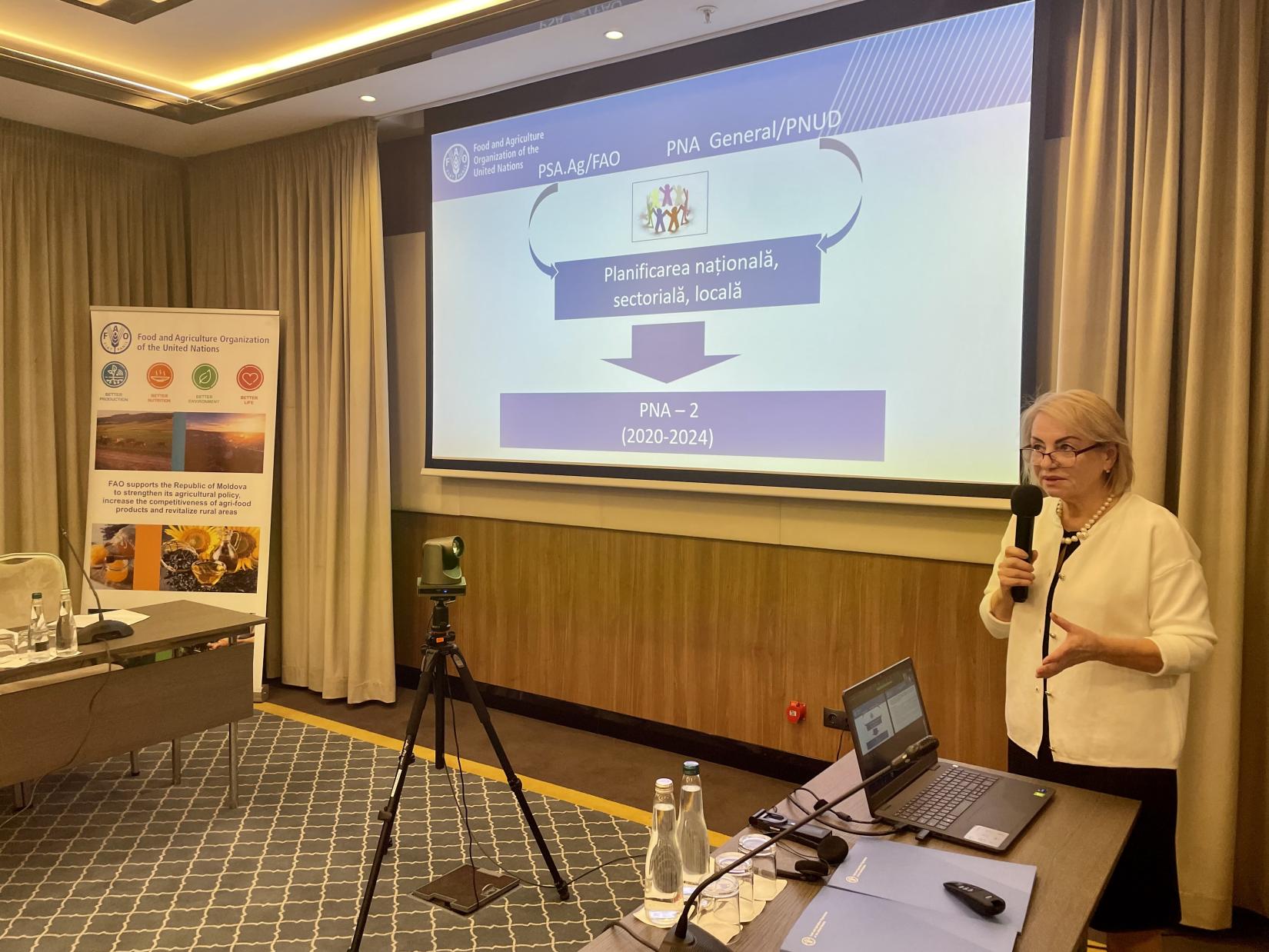The agricultural sector in the Republic of Moldova is more resilient to climate change
12 February 2024
- The Republic of Moldova has made significant progress in strengthening resilience to climate change in the agricultural sector, thanks to the assistance provided by the Food and Agriculture Organization of the United Nations (FAO) through the project "Integrating Adaptation into the Planning Process to Reduce Vulnerability to Climate Change at Local and Central Levels in the Agricultural Sector of the Republic of Moldova" (AgSap) supported by the Green Climate Fund.

At the same time, efforts to integrate climate change adaptation measures into sectoral policies, to promote innovative solutions among farmers, and to ensure gender equality through the empowerment of women must continue. These are the main findings of the project's closing workshop, presented in Chisinau on 12 February 2024.
The event was attended by representatives of the Ministry of Agriculture and Food Industry (MAFI), the Ministry of Environment (ME), researchers and development institutions members, agricultural producers, international and national FAO experts and involved discussions on the project's contribution to the components of agricultural adaptation to climate change, highlighting the transfer of experience, best practices and lessons learned.
During the implementation period, which started in 2021, the project has contributed to the integration of climate change adaptation solutions into the policies of the Ministry of Environment, the Ministry of Agriculture and Food Industry and the action plans of Local Public Administrations. Thus, they are reflected in the National Climate Change Adaptation Programme (NCCAP) until 2030 and the National Strategy for Agricultural and Rural Development 2023-2027.
"Adapting to climate change involves major efforts, and in this sense, FAO has been and remains a reliable partner for public authorities. The AgSAP project, through its activities, has made a major contribution to the incorporation of adaptation measures in public policies, but also to the implementation of innovation technologies in ensuring the resilience of the Republic of Moldova to climate impacts”, stated during the event Aliona Rusnac, State Secretary, Ministry of Environment.
"Integrating climate change adaptation solutions into national public policies is one of the main achievements of the AgSAP project. We appreciate the fruitful collaboration with the Ministry of Agriculture and Food Industry and the Ministry of Environment in identifying common objectives to implement coherent policies", declared Tudor Robu, Deputy Representative of FAO Moldova.
"FAO is prepared to continue the facilitation of Moldova's efforts in adapting to climate change" underlined Tania Santivanez, Project Technical Coordinator, FAO Regional Office for Europe and Central Asia.
Seven localities from 6 districts - Cahul, Basarabeasca, Nisporeni, Călărași, Soroca, and Sîngerei, have benefited from expertise in developing action plans on climate change adaptation at community level, which can be replicated by each territorial administrative unit. These local plans include the assessment of climate vulnerabilities, adaptation actions and estimated costs, an implementation guide, and a plan for monitoring and evaluating the efficiency of these actions.
To ensure long-term implementation of good practices, the project supported the establishment of the Community of Practices (CoP) in climate-smart agriculture as a successful tool for local capacity building and social capital development in the agricultural sector, as well as a platform for exchange of experience for more than 200 farmers and rural households implementing innovative practices including conservative agriculture, demonstrating efficient use of resources and positive impact on production yield even under drought conditions.
Present at the event, Ala Druță, FAO AgSAP Project Coordinator, emphasized the importance of ensuring support for the private sector and small farmers in adapting to climate change at the local level, especially through knowledge transfer, promoting innovation and conservative agriculture technologies.
In the period 2021-2023, the project organised more than 40 workshops, trainings and practical courses to strengthen the capacities of representatives of relevant public institutions, farmers, and journalists in the process of adapting to climate change and in promoting resilient agricultural measures.
Participants at the final event also discussed the actions that need to be undertaken to continue the strengthening of the agri-food system to make it more resilient, efficient, and sustainable to ensure better production, a better environment, and a better quality of life without leaving anyone behind.
One of the final activities of the project was the development of an investment project note, based on the assessment of technological needs for adaptation of the agricultural sector to climate change, carried out earlier in the same project. The investment project note is to be proposed for funding to climate donors by the FAO in partnership with the Ministry of Agriculture and Food Industry and the Ministry of Environment, and in case of a positive response, the project could be implemented in 12 districts in the southern, eastern, northern and central regions of the country, according to the contribution of the districts in ensuring the country's food security.
Related resources:



